- Home
- Truman Capote
The Grass Harp Page 2
The Grass Harp Read online
Page 2
Calling to each other, hooting like owls loose in the daytime, we worked all morning in opposite parts of the woods. Towards afternoon, our sacks fat with skinned bark, tender, torn roots, we climbed back into the green web of the China tree and spread the food. There was good creek water in a mason jar, or if the weather was cold a thermos of hot coffee, and we wadded leaves to wipe our chicken-stained, fudge-sticky fingers. Afterwards, telling fortunes with flowers, speaking of sleepy things, it was as though we floated through the afternoon on the raft in the tree; we belonged there, as the sun-silvered leaves belonged, the dwelling whippoorwills.
About once a year I go over to the house on Talbo Lane, and walk around in the yard. I was there the other day, and came across an old iron tub lying overturned in the weeds like a black fallen meteor: Dolly-Dolly, hovering over the tub dropping our grain-sack gatherings into boiling water and stirring, stirring with a sawed-off broomstick the brown as tobacco spit brew. She did the mixing of the medicine alone while Catherine and I stood watching like apprentices to a witch. We all helped later with the bottling of it and, because it produced a fume that exploded ordinary corks, my particular job was to roll stoppers of toilet paper. Sales averaged around six bottles a week, at two dollars a bottle. The money. Dolly said, belonged to the three of us, and we spent it fast as it came in. We were always sending away for stuff advertised in magazines: Take Up Woodcarving, Parcheesi: the game for young and old. Anyone Can Play A Bazooka. Once we sent away for a book of French lessons: it was my idea that if we got to talk French we would have a secret language that Verena or nobody would understand. Dolly was willing to try, but "Passez-moi a spoon" was the best she ever did, and after learning "Je suis fatigue," Catherine never opened the book again: she said that was all she needed to know.
Verena often remarked that there would be trouble if anyone ever got poisoned, but otherwise she did not show much interest in the dropsy cure. Then one year we totaled up and found we'd earned enough to have to pay an income tax. Whereupon Verena began asking questions: money was like a wildcat whose trail she stalked with a trained hunter's muffled step and an eye for every broken twig. What, she wanted to know, went into the medicine? and Dolly, flattered, almost giggling, nonetheless waved her hands and said Well this and that, nothing special.
Verena seemed to let the matter die; yet very often, sitting at the supper table, her eyes paused ponderingly on Dolly, and once, when we were gathered in the yard around the boiling tub, I looked up and saw Verena in a window watching us with uninterrupted fixity: by then, I suppose, her plan had taken shape, but she did not make her first move until summer.
Twice a year, in January and again in August, Verena went on buying trips to St. Louis or Chicago. That summer, the summer I reached sixteen, she went to Chicago and after two weeks returned accompanied by a man called Dr. Morris Ritz. Naturally everyone wondered who was Dr. Morris Ritz? He wore bow ties and sharp jazzy suits; his lips were blue and he had gaudy small swerving eyes; altogether, he looked like a mean mouse. We heard that he lived in the best room at the Lola Hotel and ate steak dinners at Phil's Cafe. On the streets he strutted along bobbing his shiny head at every passerby; he made no friends, however, and was not seen in the company of anyone except Verena, who never brought him to the house and never mentioned his name until one day Catherine had the gall to say, "Miss Verena, just who is this funny looking little Dr. Morris Ritz?" and Verena, getting white around the mouth, replied: "Well now, he's not half so funny looking as some I could name."
Scandalous, people said, the way Verena was carrying on with that little Jew from Chicago: and him twenty years younger. The story that got around was that they were up to something out in the old canning factory the other side of town. As it developed, they were; but not what the gang at the pool-hall thought Most any afternoon you could see Verena and Dr. Morris Ritz walking out toward the canning factory, an abandoned blasted brick ruin with jagged windows and sagging doors. For a generation no one had been near it except school-kids who went there to smoke cigarettes and get naked together. Then early in September, by way of a notice in the Courier, we learned for the first time that Verena had bought the old canning factory; but there was no mention as to what use she was planning to make of it. Shortly after this, Verena told Catherine to kill two chickens as Dr. Morris Ritz was coming to Sunday dinner.
During the years that I lived there. Dr. Morris Ritz was the only person ever invited to dine at the house on Talbo Lane. So for many reasons it was an occasion. Catherine and Dolly did a spring cleaning: they beat rugs, brought china from the attic, had every room smelling of floorwax and lemon polish. There was to be fried chicken and ham, English peas, sweet potatoes, rolls, banana pudding, two kinds of cake and tutti-frutti ice cream from the drugstore. Sunday noon Verena came in to look at the table: with its sprawling centerpiece of peach-colored roses and dense fancy stretches of silverware, it seemed set for a party of twenty; actually, there were only two places. Verena went ahead and set two more, and Dolly, seeing this, said weakly Well, it was all right if Collin wanted to eat at the table, but that she was going to stay in the kitchen with Catherine. Verena put her foot down: "Don't fool with me. Dolly. This is important. Morris is coming here expressly to meet you. And what-is more, I'd appreciate it if you'd hold up your head: it makes me dizzy, hanging like that."
Dolly was scared to death: she hid in her room, and long after our guest had arrived I had to be sent to fetch her. She was lying in the pink bed with a wet washrag on her forehead, and Catherine was sitting beside her. Catherine was all sleeked up, rouge on her cheeks like lollipops and her jaws Jammed with more cotton than ever; she said, "Honey, you ought to get up from there-you're going to ruin that pretty dress." It was a calico dress Verena had brought from Chicago; Dolly sat up and smoothed it, then immediately lay down again: "If Verena knew how sorry I am," she said helplessly, and so I went and told Verena that Dolly was sick. Verena said she'd see about that, and marched off leaving me alone in the hall with Dr. Morris Ritz.
Oh he was a hateful thing. "So you're sixteen," he said, winking first one, then the other of his sassy eyes. "And throwing it around, huh? Make the old lady take you next time she goes to Chicago. Plenty of good stuff there to throw it at." He snapped his fingers and jiggled his razde-dazzle, dagger-sharp shoes as though keeping time to some vaudeville tune: he might have been a tapdancer or a soda-jerk, except that he was carrying a brief case, which suggested a more serious occupation. I wondered what kind of doctor he was supposed to be; indeed, was on the point of asking when Verena returned steering Dolly by the elbow.
The shadows of the hall, the tapestried furniture failed to absorb her; without raising her eyes she lifted her hand, and Dr. Ritz gripped it so ruggedly, pumped it so hard she went nearly off balance. "Gee, Miss Talbo; am I honored to meet you!" he said, and cranked his bow tie.
We sat down to dinner, and Catherine came around with the chicken. She served Verena, then Dolly, and when the doctor's turn came he said, 'Tell you the truth, the only piece of chicken I care about is the brain: don't suppose you'd have that back in the kitchen, mammy?"
Catherine looked so far down her nose she got almost cross" eyed; and with her tongue all mixed up in the cotton wadding she told him that, "Dolly's took those brains on her plate."
"These southern accents, Jesus," he said, genuinely dismayed.
"She says I have the brains on my plate," said Dolly, her cheeks red as Catherine's rouge. "But please let me pass them to you."
"If you're sure you don't mind..."
"She doesn't mind a bit," said Verena. "She only eats sweet things anyway. Here, Dolly: have some banana pudding."
Presently Dr. Ritz commenced a fit of sneezing. "The flowers, those roses, old allergy..."
"Oh dear," said Dolly who, seeing an opportunity to escape into the kitchen, seized the bowl of roses: it slipped, crystal crashed, roses landed in gravy and gravy landed on us all. "You see," she said, speaking to herself
and with tears teetering in her eyes, "you see, it's hopeless."
"Nothing is hopeless. Dolly; sit down and finish your pudding," Verena advised in a substantial, chin-up voice. "Besides, we have a nice little surprise for you. Morris, show Dolly those lovely labels."
Murmuring "No harm done," Dr. Ritz stopped rubbing gravy splotches off his sleeve, and went into the hall, returning with his brief case. His fingers buzzed through a sheaf of papers, then lighted on a large envelope which he passed down to Dolly.
There were gum-stickers in the envelope, triangular labels with orange lettering: Gipsy Queen Dropsy Cure: and a fuzzy picture of a woman wearing a bandana and gold earloops. "First class, huh?" said Dr. Ritz. "Made in Chicago. A friend of mine drew the picture: real artist, that guy," Dolly shuffled the labels with a puzzled, apprehensive expression until Verena asked: "Aren't you pleased?"
The labels twitched in Dolly's hands. "I'm not sure I understand."
"Of course you do," said Verena, smiling thinly. "It's obvious enough. I told Morris that old story of yours and he thought of this wonderful name."
"Gipsy Queen Dropsy Cure: very catchy, that," said the doctor. "Look great in ads."
"My medicine?" said Dolly, her eyes still lowered. "But I don't need any labels, Verena. I write my own."
Dr. Ritz snapped his fingers. "Say, that's good! We can have labels printed like her own handwriting: personal, see?"
"We've spent enough money already," Verena told him briskly; and, turning to Dolly, said: "Morris and I are going up to Washington this week to get a copyright on these labels and register a patent for the medicine-naming you as the inventor, naturally. Now the point is. Dolly, you must sit down and write out a complete formula for us."
Dolly's face loosened; and the labels scattered on the floor, skimmed. Leaning her hands on the table she pushed herself upward; slowly her features came together again, she lifted her head and looked blinkingly at Dr. Ritz, at Verena. "It won't do," she said quietly. She moved to the door, put a hand on its handle. "It won't do: because you haven't any right, Verena. Nor you, sir."
I helped Catherine clear the table: the ruined roses, the uncut cakes, the vegetables no one had touched. Verena and her guest had left the house together; from the kitchen window we watched them as they went toward town nodding and shaking their heads. Then we sliced the devil's-food cake and took it into Dolly's room.
Hush now! hush now! she said when Catherine began light' ing into That One. But it was as though the rebellious inner whispering had become a raucous voice, an opponent she must outshout: Hush now! hush nowl until Catherine had to put her arms around Dolly and say hush, too.
We got out a deck of Rook cards and spread them on the bed. Naturally Catherine had to go and remember it was Sunday; she said maybe we could risk another black mark in the Judgment Book, but there were too many beside her name already. After thinking it over, we told fortunes instead. Sometime around dusk Verena came home. We heard her footsteps in the hall; she opened the door without knocking, and Dolly, who was in the middle of my fortune, tightened her hold on my hand. Verena said: "Collin, Catherine, we will excuse you."
Catherine wanted to follow me up the ladder into the attic, except she had on her fine clothes. So I went alone. There was a good knothole that looked straight down into the pink room; but Verena was standing directly under it, and all I could see was her hat, for she was still wearing the hat she'd put on when she left the house. It was a straw skimmer decorated with a cluster of celluloid fruit. "Those are facts," she was saying, and the fruit shivered, shimmered in the blue dimness. "Two thousand for the old factory. Bill Tatum and four carpenters working out there at eighty cents an hour, seven thousand dollars worth of machinery already ordered, not to mention what a specialist like Morris Ritz is costing. And why? All for youl"
"All for me?" and Dolly sounded sad and failing as the dusk. I saw her shadow as she moved from one part of the room to another. "You are my own flesh, and I love you tenderly; in my heart I love you. I could prove it now by giving you the only thing that has ever been mine: then you would have it all. Please, Verena," she said, faltering, "let this one thing belong to me."
Verena switched on a light. "You speak of giving," and her voice was hard as the sudden bitter glare. "All these years that I've worked like a fieldhand; what haven't I given you? This house, that..."
"You've given everything to me," Dolly interrupted softly. "And to Catherine and to Collin. Except, we've earned our way a bit: we've kept a nice home for you, haven't we?"
"Oh a fine home," said Verena, whipping off her hat Her face was full of blood. "You and that gurgling fool. Has it not struck you that I never ask anyone into this house? And for a very simple reason: I'm ashamed to. Look what happened today."
I could hear the breath go out of Dolly. "I'm sorry," she said faintly. "I am truly. I'd always thought there was a place for us here, that you needed us somehow. But it's going to be all right now, Verena. We'll go away."
Verena sighed. "Poor Dolly. Poor poor thing. Wherever would you go?"
The answer, a little while in coming, was fragile as the flight of a moth; "I know a place."
Later, I waited in bed for Dolly to come and kiss me goodnight. My room, beyond the parlor in a faraway comer of the house, was the room where their father, Mr. Uriah Talbo, had lived. In his mad old age, Verena had brought him here from the farm, and here he'd died, not knowing where he was. Though dead ten, fifteen years, the pee and tobacco old-man smell of him still saturated the mattress, the closet, and on a shelf in the closet was the one possession he'd carried away with him from the farm, a small yellow drum: as a lad my own age he'd marched in a Dixie regiment rattling this little yellow drum, and singing. Dolly said that when she was a girl she'd liked to wake up winter mornings and hear her father singing as he went about the house building fires; after he was old, after he'd died, she sometimes heard his songs in the field of Indian grass. Wind, Catherine said; and Dolly told her: But the wind is us-it gathers and remembers all our voices, then sends them talking and telling through the leaves and the fields -I've heard Papa clear as day.
On such a night, now that it was September, the autumn winds would be curving through the taut red grass, releasing all the gone voices, and I wondered if he was singing among them, the old man in whose bed I lay falling asleep.
Then I thought Dolly at last had come to kiss me goodnight, for I woke up sensing her near me in the room; but it was almost morning, beginning light was like a flowering foliage at the windows, and roosters ranted in distant yards. "Shhh, Collin," Dolly whispered, bending over me. She was wearing a woolen winter suit and a hat with a traveling veil that misted her face. "I only wanted you to know where we are going."
"To the tree-house?" I said, and thought I was talking in my sleep.
Dolly nodded. "Just for now. Until we know better what our plans will be." She could see that I was frightened, and put her hand on my forehead.
"You and Catherine: but not me?" and I was jerking with a chill. "You can't leave without me."
The town clock was tolling; she seemed to be waiting for it to finish before making up her mind. It struck five, and by the time the note had died away I had climbed out of bed and rushed into my clothes. There was nothing for Dolly to say except: '"Don't forget your comb."
Catherine met us in the yard; she was crooked over with the weight of a brimming oilcloth satchel; her eyes were swollen, she had been crying, and Dolly, oddly calm and certain of what she was doing, said it doesn't matter, Catherine-we can send for your goldfish once we find a place. Verena's closed quiet windows loomed above us; we moved cautiously past them and silently out the gate. A fox terrier barked at us; but there was no one on the street, and no one saw us pass through the town except a sleepless prisoner gazing from the jail. We reached the field of Indian grass at the same moment as the sun. Dolly's veil flared in the morning breeze, and a pair of pheasants, nesting in our path, swept before us, their metal wi
ngs swiping the cockscomb-scarlet grass. The China tree was a September bowl of green and greenish gold: Gonna fall, gonna bust our heads, Catherine said, as all around us the leaves shook down their dew.
Two
If it hadn't been for Riley Henderson, I doubt anyone would have known, or at least known so soon, that we were in the tree.
Catherine had loaded her oilcloth satchel with the leftovers from Sunday dinner, and we were enjoying a breakfast of cake and chicken when gunfire slapped through the woods. We sat there with cake going dry in our mouths. Below, a sleek bird dog cantered into view, followed by Riley Henderson; he was shouldering a shotgun and around his neck there hung a garland of bleeding squirrels whose tails were tied together. Dolly lowered her veil, as though to camouflage herself among the leaves.
He paused not far away, and his wary, tanned young face tightened; propping his gun into position he took a roaming aim, as if waiting for a target to present itself. The suspense was too much for Catherine, who shouted: "Riley Henderson, don't you dare shoot us!"

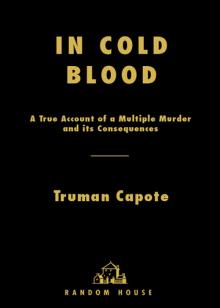 In Cold Blood
In Cold Blood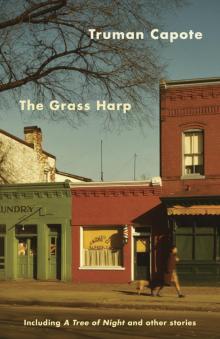 The Grass Harp, Including a Tree of Night and Other Stories
The Grass Harp, Including a Tree of Night and Other Stories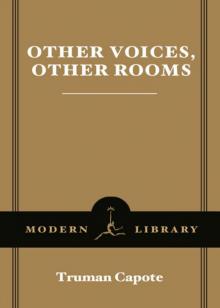 Other Voices, Other Rooms
Other Voices, Other Rooms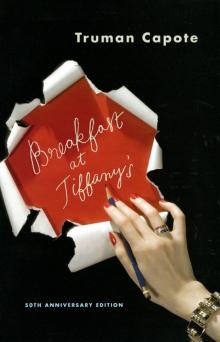 Breakfast at Tiffany's
Breakfast at Tiffany's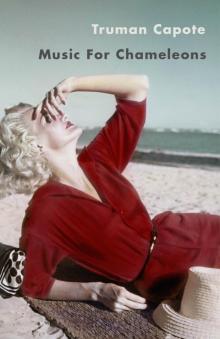 Music For Chameleons
Music For Chameleons A Christmas Memory, Including One Christmas and the Thanksgiving Visitor
A Christmas Memory, Including One Christmas and the Thanksgiving Visitor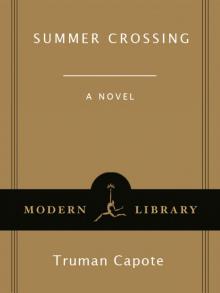 Summer Crossing
Summer Crossing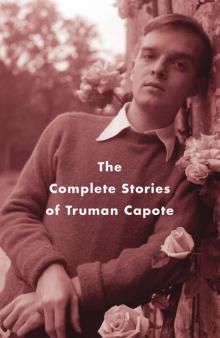 The Complete Stories of Truman Capote
The Complete Stories of Truman Capote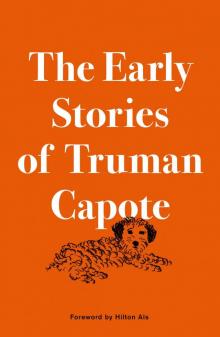 The Early Stories of Truman Capote
The Early Stories of Truman Capote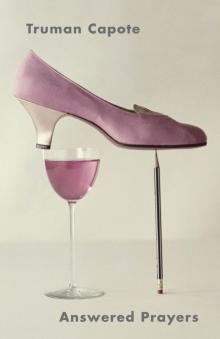 Answered Prayers
Answered Prayers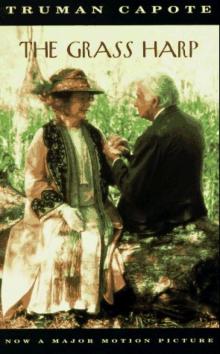 The Grass Harp
The Grass Harp SSC (2004) The Complete Stories of Truman Capote
SSC (2004) The Complete Stories of Truman Capote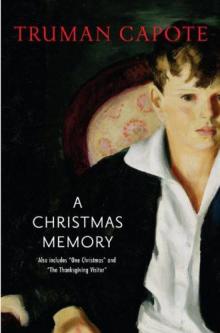 A Christmas Memory
A Christmas Memory